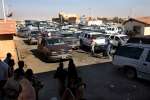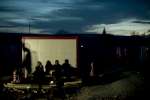Sharjah Meet: UNHCR calls for urgent protection action for refugee children
News Stories, 15 October 2014
SHARJAH, United Arab Emirates, October 16 (UNHCR) – UN High Commissioner for Refugees António Guterres called Wednesday at a landmark conference in Sharjah for urgent action to strengthen protection for millions of refugee children.
"Protecting refugee children is a core priority for UNHCR, and doing this right requires the close collaboration of all stakeholders," Guterres told delegates at the opening of the two-day "Investing in the Future" conference, which is being hosted by Sharjah's ruler, Sheikh Sultan bin Muhammad Al Qasimi, who also addressed participants. The focus is on the Middle East and North Africa.
"We must do better to keep refugee children safe – through giving them access to quality education, psycho-social care and targeted support for those with specific needs, and by ensuring they are registered at birth. But equally important is support to their families and communities so they can protect them better," added the High Commissioner.
He said the Sharjah conference provided an opportunity to "work together towards improving the protection of refugee children in the region. I hope this meeting will help expand and strengthen partnerships among governments, civil society, international organizations and the private sector, and that during our discussions we can identify specific actions to ensure refugee children and adolescents are better protected and given hope for the future."
Guterres told delegates that children, the most vulnerable demographic group in times of conflict and displacement, now make up half of the world's refugees, the highest proportion in more than a decade. The situation in the Middle East was particularly grave, with crises in Syria and Iraq. "Here in this region, every single minute, another child is forced to flee his or her country," he revealed.
"The impact of forced displacement on children is enormous," Guterres said. "Many of the refugee children I have met experienced the violence and brutality of war, lost loved ones or were wounded themselves."
Their life in exile was full of uncertainty and daily struggles. "Many are separated from their families, have difficulties accessing basic services, and live in increasing poverty. Only one in two Syrian refugee children in the neighbouring countries is receiving education," Guterres added.
"We know that refugee children are at increased risk of child labour and recruitment, and more vulnerable to violence in their homes, communities or schools, including sexual and gender-based violence. This is one of the reasons, along with financial difficulties, why more and more refugee parents agree to marry off their daughters as children."
The High Commissioner said the consequences of violence against children were "serious, long-term and costly" – for both the children affected and their societies. "As displacement becomes more protracted, more investment is needed to support national child protection systems and services, provided by both government and national civil society organizations."
Guterres said: "We must not allow these children to become a lost generation. If we do not protect them from exploitation and abuse, if we leave them uneducated and unskilled, it will delay by many years the recovery and development of their countries."
In a separate address, Jordan's Queen Rania described the massive displacement in Syria as "a slap in the face of humanity." She also urged continued international support for host nations like Jordan, adding that "the needs are far greater than the support offered."
More than 300 delegates, including government officials, humanitarian aid workers and experts in refugee affairs and child protection are discussing a wide range of issues at the meeting. Topics include sexual and gender-based violence; protecting children affected by armed conflict; birth registration and legal documentation of babies born in refuge; exploitation and separation; education, and empowering youth as agents of change.
UNHCR Eminent Advocate Sheikha Jawaher Bint Mohammed Al Qasimi, wife of the Sharjah ruler, helped organize the conference, the first of its kind in the region. The meeting is expected to issue a set of principles on the protection of child refugees before ending on Thursday afternoon.
By Mohammed Abu Asaker in Sharjah, United Arab Emirates













































